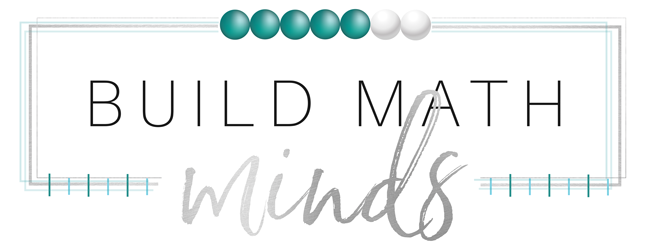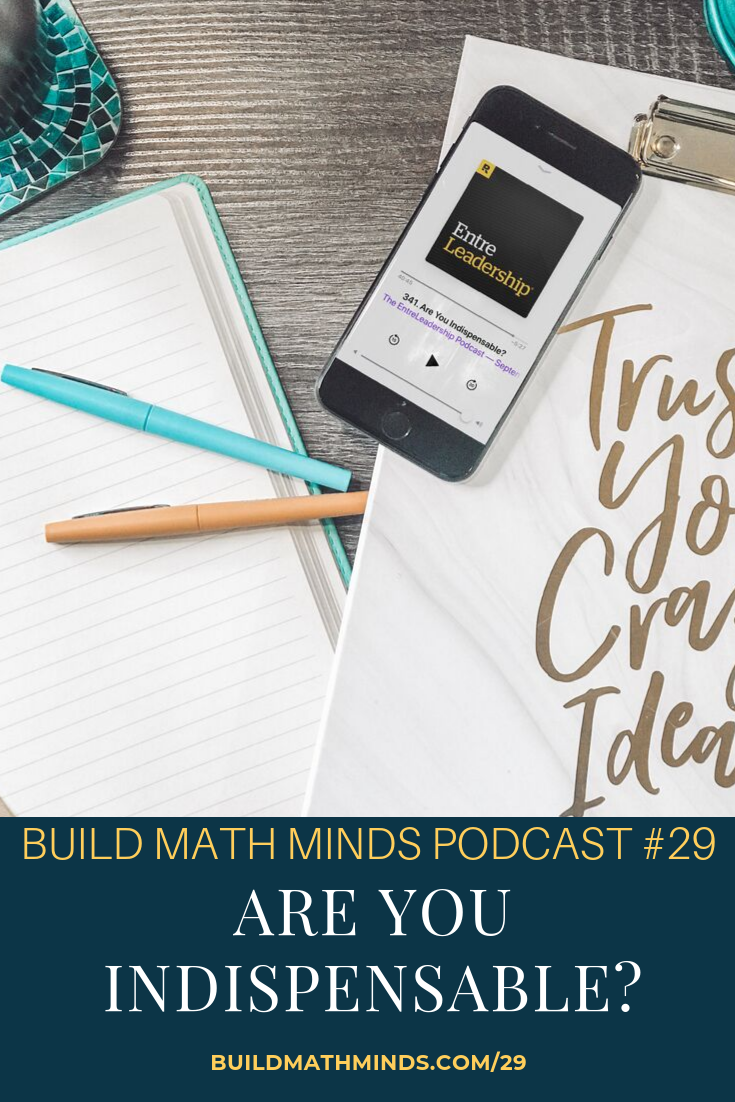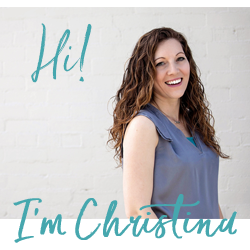Resources mentioned in this episode:
Linchpin: Are You Indispensable? by Seth Godin
Your Guide to Teaching Math Without a Textbook
Teaching Math Without a Textbook video series
Welcome fellow Recovering Traditionalists to Episode 29. Today we are delving into a touchy subject as I ask “Are you Indispensable?”
I’m a firm believer that things come into our lives when we need it. The day I’m recording this, after I dropped my kids off at school I was looking for a podcast to listen to on my drive. A podcast I hadn’t listened to in a long time popped up. The podcast is Entreleadership and the title of the episode was “Are you Indispensable?” Intrigued by the title I played it and was I glad I did.
I’ve been doing a series over on my vlog, The Recovering Traditionalist, about why we need to stop teaching math with a textbook. I’ve gotten some people who whole-heartedly agree with me, but I’ve also gotten some people who very much disagree with me. This podcast episode that I listened to this morning made me even more affirmed in my stance against textbooks.
Normally on this podcast I talk about articles or books I’ve read, but today I want to share with you the podcast episode I listened to. The guest on this episode of Entreleadership was Seth Godin who has authored many books but on this episode he was discussing ideas from his book Linchpin: Are You Indispensable?
45 seconds into the podcast, the host of Entreleadership, Alex Judd says “At the heart of work that matters is a choice you and I must both make: will you choose to be a cog that can be replaced or will you choose to be a Linchpin that is indispensable? Seth argues that the system is stacked against you to play the role of a cog.”
Seth Godin – “The industrial system, the one that made us all who we are today, needs cogs. It needs people who are undifferentiated, replaceable, fit in the org chart into a square box and most of all do what they are told. Doing what you are told is essential if you’re going to build an institution of people who are part of a giant machine, right? Well, that makes perfect sense in 1940, or 1960, or 1980 because the value in our economy and the joy was created by being part of these machines. But now the world is changing. Because, if I can write down what you do for a living I can find someone cheaper than you to do it…”
Now unfortunately, we see this happening in education. In some districts who are hiring brand new teachers with no experience or higher degrees getting hired over teachers with lots of years of experience and a master’s degree because the district can hire the brand new teacher for way less money.
At 1:54 Seth goes on to say “If being a cog means being replaced, being disrespected, being underpaid…what is your alternative? And your alternative is to level up and to be one-of-a-kind. Somebody who uses judgement, who performs emotional labor, not just physical labor. Somebody we would miss if you were gone. And I call that person a Linchpin.”
Alex Judd says “You describe that person as being someone that’s indispensable. What are the actions that you look for or what are the kind of hallmarks that make these people, the Linchpins, really stand out in the marketplace?”
Seth – It is true that I use the word “indispensable” but let’s agree that nobody is actually ultimately indispensable, that the world will go on without you. But in the short run, some people are a lot more indispensable than others. These are people who bring a unique sensibility to what they do….
He goes on to say “So the question we need to ask ourselves is ‘Do I do this job in a way that is distinct, that’s personal, that shows that I care more than the average bear. Or do I do this job in a deniable, standard way. And I think that’s a choice.”
Alex then asks “How do you actually evaluate ‘okay am I playing the role of a cog in my day to day world or am I playing the role of a Linchpin? Which one am I? How do you actually look in the mirror and make that decision?’”
Seth replies but there is a particular part of that reply that I want to read for you he says “The reason that most people don’t want to be Linchpins is not because they’re not capable of it. It’s because they’re afraid of being blamed. It’s easier to go to work and do what we were brainwashed to do, which is to follow instructions, to ask ‘Will this be on the test?’, to be able to say ‘I’m just doin’ my job.’ What it means to choose to be a Linchpin is to say ‘I am taking responsibility for what is about to happen next. I am not doing it cause it’s my job. I’m doing it cause it’s the right thing to do’. And that’s HARD.”
Then at 6:50 Seth says, ”We know from endless studies, people don’t hate their jobs because of what they get paid. They get frustrated with their jobs because they don’t feel like they have control. Because they have to sit in meetings all day being told what to do, and they feel like a victim. And my point is your life, your day, is too valuable to work at a place where you feel like a victim. So if you are going to leave anyway, why don’t you first start acting like someone who owns the place cause then maybe you’ll want to stay.
Alex – “You talk all the time about making a ruckus and I think your message and kinda what you’re talking about right now, for some people, this is a ruckus. Right? This shakes people up to a degree. There’s probably some people listening to this, like, it’s a paradigm shift for them. So if they’re kind of, maybe a little bit afraid or timid of the type of change that you’re talking about and how they approach work, what would you say to that person?
Seth – Well, I’ve gotten more angry letters and emails about this book than anything I’ve ever written.
Alex – Why do you think that is?
Seth – Because it touches the fear button really directly. It calls people to attention and says “Wait a minute. Is this the way it has to be?”
Towards the end of the podcast at 39:25 Alex asks “What is the first actionable, practical thing that they can do to start doing work that matters?”
Seth – “…it really helps to find small, little things you can take responsibility for. Small, little tiny opportunities that you can use to make a difference. That these choices on your part, to do these small things and survive them, will start to remind your lizard brain that it’s not fatal. And that’s how we learned how to walk. That’s how we learned how to talk. That’s how we learned to do everything that’s important. Little tiny bits of proof that you can do it a little. Don’t try to do it a lot. Don’t quit your job and go say ‘I’m going to start the next Slack.’ That’s insane! Do something tiny and personal. Take responsibility for it. Realize it didn’t kill you and then do it again.”
The whole time I was listening to this podcast I was thinking about how it relates to education. How many of you work at a district that thinks everyone needs to follow a strict pacing guide for your curriculum, whether it’s reading, math, any subject. If your district believes that just giving teachers a curriculum and saying “follow this to a T” is what teaching is about, then your district sees teachers as a cog in a wheel and not the Linchpins that make the machine stay together and run properly.
An over reliance on textbooks, curriculum, whatever you want to call it, is one of the ways that makes teachers feel undervalued. Teachers sure as heck get underpaid, but as Seth said frustration in our jobs does NOT come from how much we get paid, it comes from how much we feel valued.
Helping teachers feel valued is about letting them teach with emotion. Letting them use what they are seeing in their classroom on a daily basis to make instructional decisions that are NOT reliant on the textbook. Teaching children is NOT like running them through a factory line and when they come out they will have all the knowledge they need. Yet, when we tell teachers to just teach the textbook that is what we are doing.
This is why I am encouraging educators to stop teaching math with a textbook. Now yes, I know you may use a textbook as a guide still but I’m here to stand up for and give a voice to all those teachers out there who are sick and tired of being a cog in a wheel. It’s time to stand up for what you know is right for your students and be a Linchpin. And as Seth said towards the end, just do tiny little things. Just get started.
If you want more information about how you can start teaching math without a textbook, I invite you to come over and watch the video series that I’m doing about how to make that happen in your classroom. All the videos haven’t been released yet. Also you can request the Guide to Teaching Elementary Math Without a Textbook over at buildmathminds.com/notextbook. In that guide I discuss why and how you can teach mathematics without a textbook. Inside that guide, I hope you will find some tiny, little things that you can start implementing tomorrow.
What I touched on here today was just the first 8 minutes of the 44 minute podcast. If you want to listen to the full thing, go find the Entreleadership podcast where ever you listen to podcasts. I’ll also link to the book Linchpin by Seth Godin. I’ve already added it to my Amazon cart and I hope you do too, because we need more Linchpins in education. As I’ve been calling you lately, you are a #mathrebel. You are doing what you know is right and you are teaching with emotion and passion, not just following the steps laid out for you in your teacher’s manual. Even the word right there tells you that you have a manual to follow!! Teaching cannot be summarized with a manual and an over reliance on textbooks makes us feel like that cog in a wheel. So here’s to more Linchpin #mathrebel teachers out there!!
Subscribe and Review in iTunes
Hey, are you subscribed to the Build Math Minds Podcast, yet? If you’re not, make sure to do that today because I don’t want you to miss any episodes! Click here to subscribe to the podcast in iTunes.
While you’re there, don’t forget to leave a review on iTunes too. I would love to know your thoughts and how we can make sure that we give you content that you will really enjoy.
To leave a review, head over to iTunes and click on “Ratings and Reviews” and “Write a Review.” I can’t wait to hear your thoughts about the podcast.





This podcast really spoke to me as our school is shifting to using our adopted materials as resources instead of day-to-day lessons. I loved it so much that I shared it with our instructional specialist, too. Change is hard, but many in our building are trying.
I’ve been working on “teaching without a textbook “ for years, and am constantly going back to your work to help me figure it out.